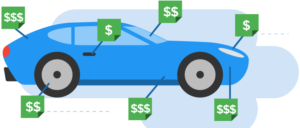When it comes to cars, much of the conversation about saving money hinges on new car prices versus used car prices. But, that’s not the only area where a person can save money. Here are seven things you may be doing that waste your money when it comes to your car.
1. Overpaying for car insurance
Sure, you want to be able to pay off your auto loan if you get into an accident. The truth is your car depreciates in value for the first few years you own it. Inspect your car insurance on an annual basis and adjust it to help reduce your annual premium.
2. Following the dealer’s maintenance schedule
While you don’t want to neglect changing out belts and fluids, you may be spending more on this each year than you really need to do. Most dealers suggest a routine maintenance every 30,000 miles, but this is sooner than the manufacturer’s schedule.
3. Paying someone else to do work you can do
Not everyone is a shade-tree mechanic, but you probably can figure out how to change the wiper blades and the air filter on your own. Buy the parts at a discount auto supply store, and you’ll rack up the savings. Change the blades annually and the filter every 20,000 miles, unless environmental conditions require more frequent changes.
4. Putting premium gas in your car
Premium gas tends to contain octane, which helps prevent your engine from knocking. However, most newer cars don’t have trouble with their engine making unnecessary noise and most older cars have other maintenance issues you’ll need to worry about instead. Save the one to two cent difference per gallon to put toward your next car purchase.
5. Changing the oil too often
Dealerships and oil changing stations suggest you change the oil in your vehicle every 3,000 miles, but manufacturers suggest changing the oil every 5,000 to 7,000 miles. Some new cars can extend the life of the oil to 15,000. The best frequency for changing your oil may vary based on the environmental conditions and your driving habits.
6. Driving on under-inflated tires
When your tires have the proper amount of pressure, you get better gas mileage. Yet, many people drive with under-inflated tires. A tire gauge costs around $5, and pressurized air is a couple of quarters at a gas station. Checking your tire pressure just once a month can help you stop wasting money.
7. Using any repair shop
Dealers can often charge more for parts and services than independent shops in need of business; however, you don’t want to wind up at an unethical shop. Look for certified repair shops and make sure the shop doesn’t do any additional work unless you approve of it. To help budget any repairs, get an estimate prior to beginning any work.
Many people often fall prey to these seven money wasters without even realizing they are doing it. With a little information, it’s possible to trim your car expenses. By saving money on these things, you may be able to buy your next car a year or two sooner than expected.

